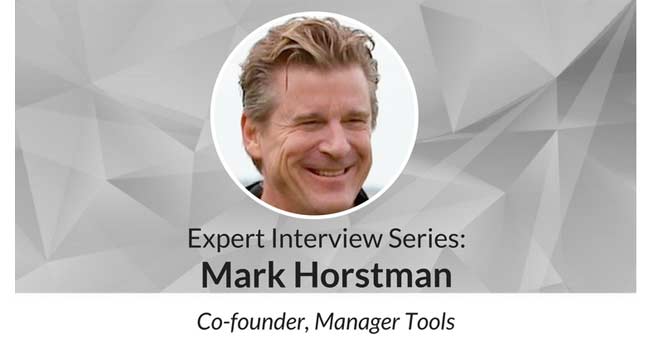Decades ago, when he first became a manager at Proctor & Gamble, Mark Horstman said he did not really have any management training to speak of. He was not alone. He found that there were no standard principles or definitive answers on the right way to manage people.
Managers tended to learn about the topic via corporate training or by reading vaguely written books by CEOs who were hoping to get consulting contracts. He may have gotten advice on handling legal problems or proprietary issues, but he found a giant knowledge gap when it came to the nuts and bolts of managing people, namely, building relationships, talking about performance and getting more out of people.
Despite the fact that he had no serious management training, he began getting calls at night from friends and colleagues asking his advice about management problems they were facing.
“One night a guy called and I said ‘I can’t help you. I have a family engagement,” Mark recalls. “After me saying ‘no’ for 15 minutes on the phone he said ‘I’ll pay you.’”
At that point Mark realized he might have a business on his hands, so he started offering his services as an executive coach and consultant. He was able to make a difference for his early clients but said the real insight came when he started doing large-scale management studies.
In one study, he followed 1,100 managers at one large multinational organization in the U.S. Of those managers, 700 engaged in weekly one-on-one meetings with members of their team who directly reported to them (or directs, as he called them). The other 400 managers did not hold these meetings. They measured the improvements in results and retention over 19 months. After 18 months they had found that 43 of the managers that they were following had gotten promotions and 42 of those promoted managers were from the test group. Despite their efforts to preclude it, managers that had not been doing one-on-one meetings began to realize that they should be doing them, so they had to stop the test.
However, in their 18 months of study, they found the overall improvement in results and retention was nearly 10 percent.
“That’s really high improvement in the management scale,” Mark says. “The group that was the constant had no change.”
He has since validated this same study three times and found similar results. Managers who held regular one-on-one meetings with directs had 10 to 11 percent improvement.
Today, Mark and his colleague Michael Auzenne consult with and train managers in Fortune 1000 companies around the world through their company, Manager Tools. The duo offers free weekly podcasts sharing advice and tips for managers and individuals on furthering their careers.
“We teach that management is no different anywhere in the world.”
There are several great leaders Mark cites when asked who has inspired him in his career.
“Those people who know me would say they’re sick of me talking about Winston Churchill – truly a great leader in a time of mortal peril,” he says.
He also mentions Abraham Lincoln, George Washington and Napoleon, leaders who were put in dire situations and were still able to cling to their ethics and their principles while also motivating large swathes of the population.
“They’re all different in their own way,” Mark says. “If I had to pick commonalities I would say clarity of purpose; they knew what they needed to do and wanted to do.”
He said they possessed good communication skills, the ability to talk one-on-one and in small groups and build a core group that can sustain change.
The role of management has remained unchanged for millennia
The skillsets that marked great leaders one hundred, two hundred or even a thousand years ago are the same ones that make great managers today, Mark observes. The role of management has not evolved at all because mankind really has not evolved at all.
“Managing in the common sense of large organizations, middle managers, has not changed appreciably,” Mark says. “The things that have changed are around the periphery – there’s a greater sense of fear and less connection to the organization.”
Things like business process re-engineering and large-scale layoffs have made managers more fearful today. Technology has also made an impact both in terms of making data available throughout an organization and also creating a distraction for employees.
Mark says the single biggest change in a manager’s day-to-day life in the past 30 years is email.
“Most managers before email had time to think, had time to plan,” Mark says. “The moment email came in, it was as if you laid a blanket over all their time.”
The problem is not email itself though. It is that people do email poorly.
Mark says that people become inordinately distracted by email, social media and messaging applications. Checking and offering instant responses to messages is not what managers are being paid to do. Their job is to be improving their results and motivating their people to improve their results.
For this reason, he tells the people he consults with to schedule three periods throughout their workday during which they are doing nothing but managing email and then not to look at their email any other time during the day.
“The moment I say that people lose their minds,” Mark says.
They insist they have an obligation to be available all the time. Mark says there is no way to be available to 100 people at the same time. What is more, he says, there are plenty of times during the day when managers are not available– if they are traveling for instance, or in a meeting with their boss or senior vice presidents. There are plenty of times throughout the day when a manager’s desire to be constantly connected is trumped by the realities of the organization. If there is an urgent need from a boss or a co-worker, chances are they are not using email to contact you anyway. You will get a call or a text.
He said people who try his suggestion of only checking email three times a day are surprised by the results.
“In 87 percent of the cases people are astounded that they can get to inbox zero, they no longer have that level of anxiety and no one notices,” says Mark.
Effective management is simply getting the job done
There is nothing complicated about what it means to be an effective manager, Mark says. It is simply someone who achieves the goals her boss set for her and retains people. She is not cracking the whip so hard that people leave and she is also attracting good people who want to work with her.
To be an effective manager, you have to beat the organization’s average retention rate.
Mark says there are 15 behaviors that management science has figured out are important for managers to adopt. He has distilled it down to four that he says represent 75 percent of your ability to get the job done whether you are a young manager or a CEO.
“If you master these, we guarantee you’ll get great results,” Mark says.
- Get to know your people. Spend time learning about their strengths and their weaknesses, what is important to them and how they prefer to communicate in order to develop a trusting relationship. It is not about becoming friends per se, but getting to know them personally.
- Be willing to talk about performance. You have to be willing to talk about how your directs are doing their jobs on a regular basis– not annually, quarterly, monthly– but all the time. You need to talk to them both about what they do well and what is not good about what they are doing. “Both of these are half of your ability to get the things you want,” Mark says. Avoid using the so-called “feedback sandwich” – sharing two positives with a negative in the middle. From a direct’s perspective, it says that you do not trust them enough to tell them they made a mistake. “If I haven’t worked hard to establish trust with you, then almost nothing I tell you about your performance will help.”
- Ask for more. Raise the bar of performance consistently, though not excessively. Many managers believe that if their group or division or company grows by 10 percent, then staff/personnel should grow by 10 percent. But productivity is the biggest driver of profitability, and productivity is basically total output divided by costs– the biggest of which is labor/people. If your revenue grows but your profitability does not, the value of your company and its ability to grow further are reduced. Productive growth comes from growing the skills and abilities of existing people, versus adding more.
- Push work down. As a general rule, Managerial Economics 101 says that any task that can be done by a boss and a team member should be done by the team member. It is overly simplistic, but it is basically cheaper labor. There is a natural tendency, as organizations get larger, for people to reduce their risk. They start preferring to have their boss make their decisions. Effective managers push against that by looking for frequent opportunities to push work, decisions, programs, policies, plans, projects, down to the next level. That helps groom the next level down, and frees up time at the manager’s level, to do things she can do which her team members may not be able to do.
In order to improve how they manage, Mark says leaders need to take back their calendar. Calendars are a place to put priorities in place. Chances are, you are not as busy as you think. In order to develop better relationships, managers need to start by taking back their calendars even one month out– an hour here, an hour there– setting aside a half hour a week to sit down with each of your directs.
By not spending time talking to your directs each week, you will end up eating your time with emails, voicemails and texts from them.
He says the single biggest mistake he sees most managers make is focusing on the work they want to get done rather than managing the people who work for them.
“They define themselves as working managers and they underinvest in their people,” he says. However, there is no way one person can do the work that six people working under them can do. These managers often do not feel comfortable leading people, so they leave their teams alone, only communicating with them when there are performance reviews or big mistakes.
“Sooner and smaller is better than larger and later,” he says.
Talk to your directs early and often about errors to prevent massive mistakes down the road.
Advice for new managers
The biggest challenge facing new managers is going from being an individual contributor to someone who has people reporting to him or her. People might get promoted because of a certain skill set, but when they are not given any direction about what their new roles should entail, they do not know what their bosses’ expectations are, so they continue to focus on the job they were doing previously.
“Role power is 10 percent of your ability to get stuff done, expertise power is 5 percent,” Mark says. “The other 85 percent is building relationships.”
Companies can get ahead of this by offering individuals they plan to move into management some online training that will teach them the basic principles of managing people, the things that every effective manager does.
Mark recommends checking out the Manager Tools podcast, where you can learn everything you need to know about being a great manager for free.
“In the land of the blind, the one-eyed person is king or queen,” Mark says. “You just have to not suck.”
If you benefited from this interview, take a moment to get hubEngage’s employee engagement insights e-newsletter today and receive actionable tips and insights on building engagement and managing people effectively.














